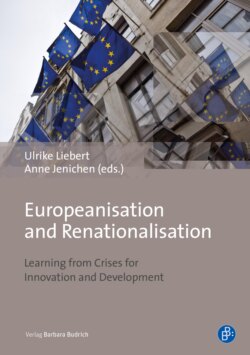Читать книгу Europeanisation and Renationalisation - Группа авторов - Страница 5
На сайте Литреса книга снята с продажи.
1. [9] The double-edged nature of crises – sources of decline; resources for development Anne Jenichen and Ulrike Liebert Introduction
ОглавлениеThis book contributes to the ‘debate on the future of Europe’ that the European Commission launched in 2017 and that supposedly will not end when the European elections in 2019 are over. The aim of this debate is to respond to the shocks of 2016 – a year of horrors for the European project, given the unexpected triumph of anti-European forces, first witnessed in the Brexit referendum in the UK in June and then in the US presidential elections in November. The present contributions are written in the vein of hope that it actually might be possible to learn from external and internal shocks and policy failures – and that such lessons will be useful for confronting the future. They are the outcome of individual efforts and collective discussions focusing on the years 2016 and 2017 on the part of European researchers, politicians and policy makers connected to the Jean Monnet Centre for European Studies at the University of Bremen. Their aim is to take stock of responses to the multiple crises the European Union has been struggling with over the past decade. The shared interest is to provide answers to a set of common questions: How can we gain a more nuanced understanding of the different facets of such ‘crises’, of their double-edged nature as sources of decline and destruction, but also as resources for innovation and development? In this vein, we aim at bringing together analyses of the successes and failures in managing the various crises with innovative ideas and propositions regarding the present and future development of the Union. Each of the chapters draws on state-of-the-art theory, methods and evidence. However, in the present context, the authors are more interested in enhancing the general public understanding and assessment of the EU’s responses to the crises, rather than contributing more narrowly to social scientific research.
In the second decade of the 21st century, the post-war European project provides proof of a complex crisis that has fulled pessimistic as well as optimistic narratives concerning the future of the European Union. Following the [10] negative story-lines in response to the crisis, the deepening of European integration has allegedly stalled, and disintegration is looming large. Neo-nationalism has become salient on the European political agenda, with the British decision to leave the EU as its ultimate culmination to date. Member states are more reluctant to ‘pool’ their sovereignty in sensitive domains of national identity that include control over money, borders, and citizenship identity. National governments are less willing to delegate competences to supranational entities, let alone financial and fiscal powers. By contrast, the more optimistic accounts draw on past experiences of EU crises which have frequently advanced Europeanisation, meaning the progressive harmonisation of shared legal norms and common public policies across the member states. In the present constellation, the Europeanisation agenda suggests that the EU is not in decline but is reinventing itself as a unique engine of change, driving cooperation, coordination and convergence of member states, the structural and cultural diversity of which may have become more pronounced as a result of the crises. In the perspective of Europeanisation, neo-nationalism and the agenda of re-nationalisation cannot provide solutions to the crises. Rather, nationalistic forces appear as a crucial part of the problem, as they aggravate the power asymmetries between nationally fragmented democratic governments vis-à-vis the transnational drivers of economic, social and cultural globalisation.
The EU’s recent crises and geopolitical conflicts are cases in point concerning the dramatic challenges that global dynamics have posed to European policy makers. These started with the outbreak of the sovereign debt crisis in the euro area at the end of 2009, continued with conflicts with Russia over energy security in 2009 and annexation of the Crimea in 2014, the so-called ‘refugee crisis’ in 2015 and the Brexit referendum in 2016, followed by a surge of anti-EU populist forces elsewhere, within as well as outside the EU, including Austria, the Netherlands, France, and most recently the U.S. under the Trump presidency. These multiple predicaments have jeopardised the EU’s roadmap for an ‘ever deeper Union’, undermined its commitments to open societies, and weakened solidarity among member states as well as citizens. The EU’s era of peoples’ permissive consensus in support of European policy makers has given way to falling levels of trust and invigorated nationalist populist Euro-scepticism, hampering common solutions to joint problems, whether in the area of immigration, of economic stagnation, security or global warming. Nevertheless, although rare, crises are not anomalies but normal occurrences in any complex and dynamic system such as the EU.
This introduction starts with clarifying the notion of ‘crisis’ that informs the present book. It then gives an overview of the twenty chapters contained in the three sections, dealing firstly with the domestic dynamics of Europeanisation versus neo-nationalism, turning secondly to re-examining the EU’s crises and, finally, critically reflecting on a selection of cases where European innovation and development have occurred.
